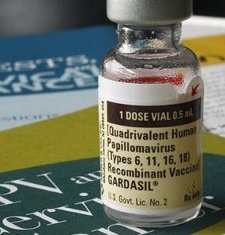Safety concerns about Gardasil HPV vaccine continue

Kansas City, MO
Since the introduction of Gardasil HPV vaccine, the FDA has reported forty seven deaths. Gardasil was approved in 2007. Cervical cancer is caused by HPV (human papillomavirus) and is easily spread. Adverse events from Gardasil in 2008 totaled 6,273, and 147 were reported at “life threatening”.
The report comes from Judicial Watch, a public interest group that monitors government corruption, obtained from the FDA. According to President Tom Fitton, "The already serious problems associated with Gardasil seem to be getting worse. No one should require this vaccine for young children."
Adverse events associated with Gardasil vaccine include cervical cancer that developed fifteen months after receiving the HPV vaccine, Guillain- Barre Syndrome after the second vaccine was given, and the death of a nineteen year old girl eleven days after receiving HPV vaccine.
The following is extracted from the FDA report: "After receiving her second dose of GARDASIL … she could crawl but … needed to use crutches or a wheel chair ... She was experienced problems breathing and had ‘super migraines' that never went away … She had swelling in her face, jaw and wrists. The patient was diagnosed with GUILLAIN-BARRE syndrome, myelin sheath degeneration and peripheral neuropathy. Patient was hospitalized twice … patient has not recovered from symptoms." Twenty nine new cases of Guillain-Barre syndrome have been seen since June 2008 in association with HPV vaccine.
Among pregnant women, 147 women who received Gardasil experienced spontaneous abortion. Genital warts developed 62 girls after the vaccine was given, appearing in other parts of the body including the hands, face and feet. One girl developed warts all over her body.
Forty one deaths occurred within one month, reported in association with Gardasil, and of those, seventeen occurred within two weeks. The cause of death is still not known.
Fitton says, "The FDA is supposed to be a guardian of public health, and yet the agency continues to turn a blind eye to what seems to be an extremely serious public health problem. The public relations push for Gardasil by Merck, politicians and public health officials needs to pause so that these adverse reactions can be further studied."
Concerns about the safety of Gardasil are not new. This year the manufacturer asked the FDA for approval of the vaccine for use in young males. The FDA is considering approval So far, twenty five percent of young women, age 9 to 26 have been vaccinated.
A mathematical study, published last year in the New England Journal of Medicine, suggested that vaccinating young women with Gardasil would be less cost effective than screening programs for cervical cancer. The cost of receiving HPV vaccine ranges from $500 to $900, and may not be covered by insurance.
Merck, the manufacturer of Gardasil responded to initial concerns about adverse events with the following statement: "Merck has analyzed the adverse events reported for Gardasil relating to the recent reports of death and paralysis, and based on the data available to Merck, believes that no safety issue related to the vaccine has been identified. These types of events are events that could also be seen in the general population."
An article published July 2008 about Gardasil safety concerns disappeared from Medscape after editorial review, and was replaced with more positive findings. You can read the original, article titled ”HPV Vaccine Adverse Events Worrisome Says Key Investigator” at Beyond Conformity. The article was replaced with “HPV Vaccine Deemed Safe and Effective, Despite Reports of Adverse Events”, and can be viewed here.
Gardasil vaccine continues to raise concerns. The medical community voiced those concerns last year, but the manufacturer of the vaccine assured the public the vaccine is safe. Judicial Watch is encouraging public health officials to step back and take a closer look at the safety concerns, and growing number of adverse events associated with Gardasil.
Diane Harper, MD, professor of community and family medicine/obstetrics and gynecology at Dartmouth Medical School, in Hanover, New Hampshire, and director of the Gynecologic Cancer Prevention Research Group at the Norris Cotton Cancer Center took part in the Gardasil clinical trials. Dr. Harper advised last year, "if you are at all concerned, then don't have the vaccine — have regular Pap smears and you will be equally protected from cervical cancer."
Escalating reports of Gardasil side effects and safety will continue to raise concerns. No one knows the long term outcomes of the Gardasil vaccine. The message to all women is, engage in regular visits to your gynecologist for cervical cancer screening. Please share your views or personal experience.
Failure to Diagnose Cervical Cancer Malpractice Lawsuits
Labels: Gardasil, HPV Vaccine

0 Comments:
Post a Comment
<< Home